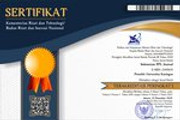THE STUDENTS’ ACHIEVEMENT IN PRONOUNCING ENGLISH SONG USING SMULE APPLICATION
Abstract
The development of science and technology forces academics to be more creative in the teaching- learning process to achieve a better quality of education. Smule application as a part of science and technology development should be used effectively and creatively as a tool in that process especially in English education field. Therefore, this research aims at describing the students’ achievement in pronouncing English song using Smule application and finding out the factors influencing students’ achievement in pronouncing English song using Smule application. This research used quantitative data with descriptive statistical approach. The data were collected through English pronunciation test and questionnaire. The English pronunciation test was used to collect the data related to students’ English pronunciation achievement and the questionnaire was used to find out the factors influencing students’ English pronunciation achievement. The results showed that the mean score of students’ achievement in pronouncing English song using Smule application was 3.81 or almost good. It was influenced by the low frequency in practicing pronunciation, the difficulty to balance singing karaoke and music instruments on fast song tempo, and the lack of using Smule application to sing karaoke.
Keywords: achievement; English song; pronunciation; smule application; university students.
Full Text:
PDFReferences
Apkmb. Sing! Karaoke by Smule v5.3.3 VIP Unlocked [New Fixes] APK [Latest]. Retrieved March 2, 2018, from https://apkmb.com/sing-karaoke-by-smule-apk/.
Ary, D., Lucy, C. J, Chris, S., & Asghar, R. (2010). Introduction to research in education (8th ed.). USA: Wadsworth, Cangage Learning.
Backley, P. (2015). Improve your English pronunciation. Retrieved March 1, 2018, from http://toefl.uobabylon.edu.iq/papers/pearson_2015_12619610.pdf.
Drum, J. (n.d.). Tempo in music: Education assistant the Phoenix Symphony. Retrieved April 11, 2018, from: https://www.phoenixsymphony.org/uploads/Tempo.pdf.
Farhati, A. T. (2011). The effectiveness of English songs as media to enhance students’ ability to pronounce English plosive voiced consonants (b, d, g). Unpublished master thesis. Department of English and Art, Semarang State University.
Gilakjani, A. P. (2012). A study of factors affecting EFL learner’s English pronunciation learning and the strategies for instructions. International Journal of Humanities and Social Science, 2(3), 120-122.
Juhansar, Mustaqim, P., & Sayit, A. K. (2016). The implementation of higher order thinking skills at UTY in Indonesia: Opportunities and challenges. Retrieved March 8, 2018, from https://www.researchgate.net/publication/324720219_The_Implementation_of_Higher_Order_Thinking_Skills_at_Universitas_Teknologi_Yogyakarta_in_Indonesia_Opportunities_and_Challenges.
Ma, R. (2015). Thesis and dissertation: The role of pronunciation in speaking test ratings. Provo: Brigham Young University.
Manik, S. (2015). Improving students’ pronunciation mastery by using English songs. Unpublished master thesis. English Department, Nommensen University.
Rengifo, A. R. (2009). Improving pronunciation through the use of karaoke in an adult English class. Bogotá: Universidad Nacional de Colombia. Retrieved March 1, 2018, from https://revistas.unal.edu.co/index.php/profile/article/view/10547/36785.
Riduwan & Sunarto. (2013). Pengantar statistika. Bandung: Alfabeta.
Ruismäki, H., Antti, J., & Kimmo, L. (2013). Karaoke–The chance to be a star. The European Journal of Social & Behavioural Sciences (eISSN: 2301-2218). Paris: C-crcs.
Utami, F. S., Pabbajah, M., & Juhansar, J., (2018). The implementation of jumbled-sentences toward students’ skill in writing report text. English Review: Journal of English Education, 7(1), 115-124. doi: 10.25134/erjee.v7i1.1501.
Voldánová, Ž. (2017). The use of songs in the classroom with a focus on grammatical mistakes. Unpublished bachelor thesis. Department of English Language and Literature, Masaryk University, Brno.
Woo, Y. (2016). Smule connecting the world through music. San Fransisco: Apteligen. Retrieved April 5, 2018 from https://www.apteligent.com/wp-content/uploads/2016/03/Apteligent-Case-Study-Smule-0316.pdf.
DOI: https://doi.org/10.25134/ieflj.v5i1.1610
Refbacks
- There are currently no refbacks.

This work is licensed under a Creative Commons Attribution-ShareAlike 4.0 International License.

